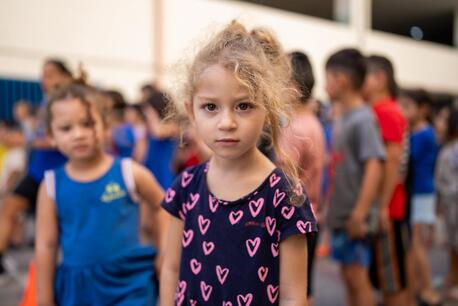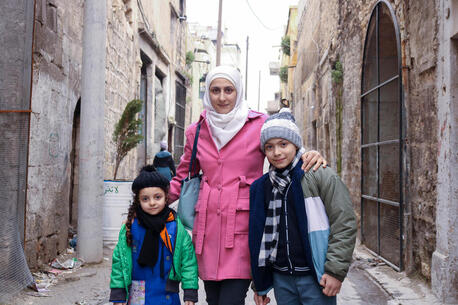
UNICEF Is Working to Protect Children From Brutal Winter Storms
For families that have already lost almost everything, bad weather can be catastrophic. Thousands of Syrian refugees living in more than 570 informal tented settlements across Lebanon were hit particularly hard in early January when a major storm system hit, bringing torrential rain, strong winds, snow and bitter cold temperatures. Tents were flooded, food stocks and furnishings destroyed.
Working with Lebanese authorities, UNICEF and other humanitarian agencies responded immediately, pumping water out of inundated sites and distributing winter clothes to children, blankets, mattresses, hygiene kits and other supplies. "If the pajamas are not the right size, I'll exchange them with my neighbor," said 11-year-old Taslim. "In winter, it is pouring and very cold," said Islam, 8. "It is very difficult for people to stay warm."

So far, 10,000 refugees have received urgent distributions, and aid agencies are working around the clock to reach all those in need after the recent storms. Approximately 850 informal settlements in Lebanon, hosting more than 70,000 refugees, are at risk of being affected by further severe weather. Above, a young Syrian refugee stands in a flooded tent settlement in the Bekaa Valley, Lebanon. Many families had to evacuate their tents, sloshing through sleet and sewage water in search of shelter. © UNICEF/UN0272710/Choufany
"Children's suffering in affected areas have increased," said Violet Speek-Warnery, UNICEF Deputy Representative to Lebanon. "In the past 10 days, UNICEF was able to reach more than 6,000 refugee children in urgent need of assistance. Our teams are working with partners around the clock to reach children with much-needed support, and to keep them warm."

Cold, wet weather can prove fatal for children already weakened by lack of proper nutrition and health care. To keep children warm and safe, UNICEF procures and delivers winter gear, including jackets, gloves, hats, scarves, socks, shoes, thermal blankets and other cold-weather supplies where they are needed most. Above, preparing for bad weather ahead, young Syrian refugees in a camp in the town of Ersal, East Lebanon, near the Syrian border, carry boxes of warm winter clothes in December 2018. © UNICEF/UN0264878/al Mussawir-Ramzi Haidar
No child should face debilitating cold without help. This winter, UNICEF aims to reach 1.3 million children in Syria, Iraq, Jordan, Lebanon, the State of Palestine, Turkey and Egypt with winter kits, safe drinking water, sanitation, health and hygiene support, and cash assistance to help families cover the cost of heating fuel and other necessities.
You can help some of the world's most vulnerable children stay warm this winter.
Top photo: On 10 January 2019 in Baalbeck, Lebanon, Syrian refugees living in informal tented settlements in Arsal struggle with dire conditions that have worsened after a strong storm hit Lebanon on 6 January. © UNICEF/UN0272704/Haidar
HOW TO HELP
There are many ways to make a difference
War, famine, poverty, natural disasters — threats to the world's children keep coming. But UNICEF won't stop working to keep children healthy and safe.
UNICEF works in over 190 countries and territories — more places than any other children's organization. UNICEF has the world's largest humanitarian warehouse and, when disaster strikes, can get supplies almost anywhere within 72 hours. Constantly innovating, always advocating for a better world for children, UNICEF works to ensure that every child can grow up healthy, educated, protected and respected.
Would you like to help give all children the opportunity to reach their full potential? There are many ways to get involved.





